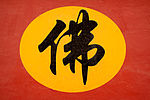Zhiyi | |
|---|---|
智顗 | |
 Painting of Śramaṇa Zhiyi. | |
| Personal | |
| Born | 16 February 538 Gong'an County, Hubei, China |
| Died | 3 August 597 (aged 59) Tiantai County, Zhejiang, China |
| Religion | Buddhism |
| Nationality | Chinese |
| School | Tiantai |
| Lineage | 4th generation |
| Other names | Chen De'an (陳德安), Master Tiantai (天台大師), Master Zhizhe (智者大師) |
| Dharma names | Zhiyi |
| Organization | |
| Temple | Waguan Temple Guoqing Temple |
| Senior posting | |
| Teacher | Faxu (法緒) Huikuang (慧曠) Nanyue Huisi |
| Zhiyi | |||||||||||||||||||
|---|---|---|---|---|---|---|---|---|---|---|---|---|---|---|---|---|---|---|---|
| Chinese name | |||||||||||||||||||
| Traditional Chinese | 智顗 | ||||||||||||||||||
| Simplified Chinese | 智𫖮 | ||||||||||||||||||
| |||||||||||||||||||
| Korean name | |||||||||||||||||||
| Hangul | 지의 | ||||||||||||||||||
| |||||||||||||||||||
| Japanese name | |||||||||||||||||||
| Kanji | 智顗 | ||||||||||||||||||
| |||||||||||||||||||
| Part of a series on |
| Chinese Buddhism |
|---|
 |
Zhiyi (Chinese: 智顗; pinyin: Zhìyǐ; Wade–Giles: Chih-i; Japanese pronunciation: Chigi; Korean: 지의; 538–597 CE) also Chen De'an (陳德安), was the fourth patriarch of the Tiantai tradition of Buddhism in China. His standard title was Śramaṇa Zhiyi (沙門智顗), linking him to the broad tradition of Indian asceticism. Zhiyi is famous for being the first in the history of Chinese Buddhism to elaborate a complete, critical and systematic classification of the Buddhist teachings. He is also regarded as the first major figure to make a significant break from the Indian tradition, to form an indigenous Chinese system.
According to David W. Chappell, Zhiyi "has been ranked with Thomas Aquinas and al-Ghazali as one of the great systematizers of religious thought and practice in world history."[1]
- ^ Swanson, Paul L. (1989). Foundations of Tʻien-Tʻai philosophy : the flowering of the two truths theory in Chinese Buddhism. Berkeley, Calif.: Asian Humanities Press. ISBN 0-89581-918-X. OCLC 19270856.